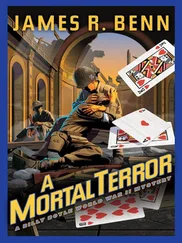Soledad looked up anyway. The drone was almost above them now, and dropping closer for a better look. “Peel off!” Soledad shouted to Ricky, who nodded and began veering off to the right, back toward the road. She stopped her bike dead, then flipped it around and drove to the left.
The drone stayed on Aiden.
Soledad didn’t see the drone fire the Hellfire missile—she wouldn’t have had time for that. The explosion at the tree line blew her completely off the motorcycle. She covered her head, hit the ground feet first, then tumbled into the irrigation ditch.
She peeked over the edge.
The first twenty feet of trees had been completely obliterated. The embers of the splintered, burning trees floated through the air. On the ground, its rear wheel spinning, Soledad could make out the twisted metal of Aiden’s bike. Near it, she could see what looked like a white lump of flesh. A mangled arm. A torn fragment of a maroon scarf she’d handed him to wipe off his handlebars.
She felt an arm on her shoulder. “Get to your damn bike!” Ricky shouted into her ear. “They’re coming back around!” She tried to get to her feet, but her left leg wouldn’t respond. Looking down, she could see the black ooze of blood creeping through her pants.
Ricky swung her roughly onto his back, then pushed himself onto the cycle. He cranked the throttle. “Aiden,” she moaned. “Son of a bitch.” Behind them, the drone dropped to attack altitude.
Levon

Detroit, Michigan
“GOOD NEWS, MR. WILLIAMS,” SAID Tommy Bradley. “Things have been taken care of.”
Levon smiled. “Thank you, sir.”
“What’s better,” said Bradley, “we got the Terrorist Mama as well, plus a deserter from the SWAT team designated to take her down. So this will play really well in the press. We’d like you to thank the administration to the media, if you would.”
“Absolutely, sir.”
“Just so you know, Levon, the president is very proud of what you’ve done there. You’ve kept people under control in a bad situation. It won’t be forgotten.”
“About that, sir.” Levon coughed. “I can only keep them tamped down for so long. My people are agitated about that attack, still. O’Sullivan being dead, that helps. But they still think the mayor is a shill for white privilege.”
Bradley went quiet on the other end of the line. The other shoe was about to drop, and he knew it. He didn’t expect Levon’s boot. “I don’t know how long I can keep these people under control,” Levon continued. “I’m going to need some authority to reconstitute the police force.”
“I can tell you the president isn’t going to use federal forces, Mr. Williams.”
“I’m not asking for that. I’m asking for you to swing some weight with the mayor. He had a deal with Big Jim. He told him he’d be remaking the police department to better reflect the community. You were going to send the attorney general to oversee the situation. There’s no need for that now, but a word from you and the mayor will get out of the way. Just tell him to appoint me to a civilian oversight board, and let me bring some good people into the force.”
Levon could hear Bradley hesitate. He pushed harder: “Your man has a reelection campaign coming up. Pardon me for saying so, but it seems to me that in the aftermath of what just happened, and with your big jobs program coming up, you’re going to need every minority vote you can get. Every black vote. Michigan’s a swing state.”
“So what are you proposing?”
“I’m just saying that there will be an awful lot of grateful people here if they knew President Mark Prescott stood with the community in reshaping its racist police department. You let me reconstruct the police department, I can guarantee voter turnout will be extremely high anywhere we tread our feet.”
“Anywhere you tread your feet?”
“Mr. Bradley, have you ever been to Eight Mile? On one side, there’s garbage. On the other side, there’s money. That money’s there because they lived off that garbage. Did you really think my people were going to sit still and let them sneer at us over their ivy gates?”
Bradley blurted uncomfortably, “If that’s a threat of violence, Mr. Williams, we can’t countenance that.”
“It isn’t. It’s a warning. We’re going to need to keep the peace. Only one way to do that. We need more badges, and people who trust those badges. Call it a pilot program. Better, have the mayor do it. Maybe he’ll do it to save his job. One call. That’s all it will take.”
“Why do you need us to intervene at all?”
“Because if I make the same…offer to the mayor, he’ll call the governor, and the governor will call the president, asking for help. You really want that?”
“Mr. Williams, you make a convincing case,” said Bradley. “I’ll be back in touch later today. Oh, and Mr. Williams? Let’s keep this between us.”
“Wouldn’t have it any other way,” said Levon, grinning.
Within days, the applications began piling up on Levon’s desk. He’d moved over to the mayor’s office, taken up virtual residence there, along with his secret political weapon, Regina Malone.
His first meeting, with the head of the police union, Lieutenant Billy Baron, had gone poorly: the man was old school blue and didn’t want to hear about changes to the department. He pointed out that they all had contracts. Levon, enjoying his newfound power, let the man stew for a few minutes. Then he told him he had every intention of honoring the contracts—there just might be a few more cops riding desks. The new boys, he said, would take over the streets. No more Ricky O’Sullivans.
Now things were running smoothly, though. Levon slotted personal interviews with each of the possible new officers. Each was slotted for ten minutes. Meanwhile, Levon worked with a committee, appointed by Mayor Burns but confirmed by Levon, to rewrite the use-of-force policies within the department. The mayor insisted that his civilian commission was blue ribbon, and that its recommendations be adopted.
Levon carefully crafted the new language. “The community expects,” the manual now read, “and the Detroit Police Department requires that officers use only the force necessary to perform all duties, and that multiple areas of consideration be assessed before any force is used. When force is used, it must be proportional. Such areas of consideration include, but are not limited to: medical condition, mental illness, physical limitation, drug use, emotional instability, and race.”
Under the “race” definition, Levon wrote, “Racial and cultural stereotypes have been utilized to dangerous effect in the past by members of this department. Racial profiling has led to disproportionate stops of those of African-American descent, and to disproportionate arrests and use of force against those of African-American descent. To that end, officers must take into account the prevailing cultural norms of any area they police, and respond to the cultural sensitivities of both suspects and the more general community.”
When told of the new strictures, dozens of officers quit right away. “Good riddance,” Levon told the mayor. “Less pensions for you to pay.” When Billy Barton walked into Levon’s new office and slapped down a list of four hundred officers willing to quit over the new standards, Levon looked him dead in the eye. “Well,” he said, “I supposed it can’t be helped. Change has casualties.”
The media embraced Levon’s new standards as groundbreaking. Racial sensitivity, they said, had never been used as an actual policing criterion, but nowhere was that criterion more necessary than Detroit. “Had Ricky O’Sullivan been taught and held accountable under these standards,” Levon said, Regina standing beside him, “perhaps Kendrick would still be alive today. Showing attitude to police officers is something a Detroit cop should have understood, had he been properly trained. Don’t call our kids thugs just because you don’t understand the experiences they’ve had growing up. They’ve seen cops pull over their dads, drag them off to jail. We have an entire generation of missing men in our community. Sensitivity is the key.”
Читать дальше













